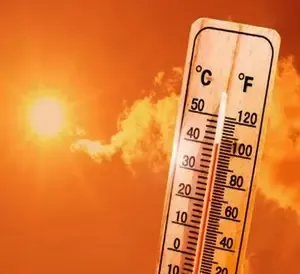Will Coastal TN Experience Intense Heat in May?

Synopsis
Key Takeaways
- Temperatures are expected to soar by 5 degrees Celsius.
- Peak heat period starts on May 4 and lasts for 25 days.
- Stay hydrated and avoid direct sun exposure.
- Monitor vulnerable individuals regularly.
- Seek medical attention for heat stress symptoms.
Chennai, May 1 (NationPress) The Regional Meteorological Centre (RMC) has predicted a significant increase in temperatures across the coastal regions of Tamil Nadu this May, with temperatures anticipated to rise by 5 degrees Celsius above the normal levels.
The peak summer heatwave, referred to locally as ‘Kathiri Veyil’ or ‘Agni Natchathiram,’ is slated to commence on May 4 and is expected to persist for a duration of 25 days.
The RMC has cautioned citizens about severe heat conditions, particularly in coastal neighborhoods, advising them to implement essential precautions.
In light of this, the Directorate of Public Health and Preventive Medicine (DPH) has released a set of safety measures to aid the public in managing the extreme heat. Residents are encouraged to stay hydrated by consuming ample amounts of water throughout the day and to limit direct sun exposure as much as possible.
"Residents are advised to remain indoors between 12 noon and 3 p.m., during peak sunlight hours,” the DPH emphasized.
Additionally, it recommended the use of umbrellas or hats for protection and advised against engaging in strenuous activities during the hottest parts of the day. The health advisory highlighted the dangers of leaving children or pets inside parked vehicles, as the internal temperatures can escalate rapidly, resulting in dire consequences.
The public has also been encouraged to reduce consumption of sugary soft drinks, coffee, tea, and alcohol, as these beverages can exacerbate dehydration.
To prevent heat accumulation indoors, the DPH suggested avoiding cooking during peak heat times and advised against walking barefoot on hot surfaces.
Residents are also urged to avoid high-protein foods and expired items, as these can amplify bodily stress in extreme heat conditions. For hydration, the department recommended homemade beverages like lemon water, buttermilk, lassi, and fruit juices with a pinch of salt. Consuming fruits and vegetables rich in water content is also advised. Special considerations were made for infants, young children, pregnant women, the elderly, individuals with heart ailments, and outdoor workers. The advisory stressed the importance of regularly monitoring vulnerable individuals, especially those living alone.
Outdoor workers were instructed to limit sun exposure, refrain from heavy tasks during peak heat, take frequent breaks in shaded areas, and drink water every 20 minutes. The public has been urged to seek immediate medical care if experiencing symptoms such as dizziness, headaches, or signs of heat stress.










